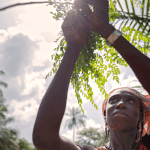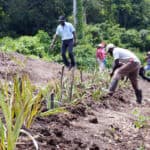Rethinking Scale in Agribusiness: An Impact Investor Explores the Massive Benefits of Being Small
At some point, every entrepreneur is asked by an investor: “Can your company scale?” In the world of traditional venture capital (VC), investors typically define scale as expanding into new geographies and serving other customer segments, thereby reaching millions of customers. If a business lacks the potential to meet these requirements, VC investors generally aren’t interested.
It is tempting for us as impact investors to try to conform to this definition of “success,” solely seeking out social enterprises that reach millions of individuals. And indeed, it’s common to see impact investors — including us at Acumen — adopt this framing, often by touting the high number of “lives impacted” by our investments, or the impressive number of individuals gaining access to our portfolio companies’ products or services. But we cannot afford this single-minded approach when it comes to agriculture in emerging markets. This focus on scale ignores the realities of agribusinesses and the urgent needs of smallholder farmers, and misses the opportunity to assess the success of a business based on its ability to expand further into value chains, deepening its impact.
We at Acumen believe it’s time to challenge the traditional expectation that a single agribusiness ought to reach millions of smallholders — or even hundreds of thousands. If we want to transform the lives of the world’s 570 million+ smallholder farmers, we need to move beyond “lives impacted” as a measure of success, and arrive at a more nuanced understanding of scale within agriculture.
But don’t just take our word for it. Acumen interviewed other impact investors and agribusinesses (both within and beyond our portfolio), aiming to better understand the perspectives of funders and entrepreneurs in this key sector. As part of this research, we asked: What does it mean for an agribusiness to scale? What factors limit the number of customers a company can reach? And how can a more nuanced definition of scale redefine how we think about success?
Scoping the Potential to Scale
These conversations and our related experience show that the average agribusiness can expect to reach between 5,000 and 10,000 smallholders. The GIIN’s impact performance benchmark for agriculture, available through IRIS+, backs this up: Across investors who reported, the average portfolio agribusiness reaches 5,643 smallholders.
One of the biggest determinants of scale potential is a company’s business model. Horizontal models that cut across value chains and offer single products or services, such as financing or insurance, demonstrate tremendous opportunities to scale. For example, companies like Juhudi Kilimo and NRSP offer loans to farmers and have reached hundreds of thousands of smallholders each. Horizontal models do have some downsides, however: According to IDH, a co-creator and co-financier of sustainable value chain solutions, “A non-holistic business (i.e. an organization focusing on only a single type of good or service) will often only be viable when coordinating with other organizations… .” Acumen has also found that horizontal models are more limited in their ability to directly impact farmer incomes and livelihoods. These types of agribusinesses can reach hundreds of thousands of farmers, but in order to achieve deeper impact, this often requires more developed markets and high levels of coordination between companies.
The Potential of Farmer-Allied Intermediaries
Vertically-integrated, high-touch, bundled service business models, on the other hand, are better suited to address the needs of smallholders, especially in the business environments where Acumen operates. Acumen refers to these models as Farmer-Allied Intermediaries: a catch-all term for aggregators, processors, producer-organizations and vertically-integrated brands that source from smallholders.
These companies face challenges unique to agriculture that narrow the number of farmers they can reach, or that make it difficult to scale a specific business model. These challenges include:
- Environmental factors which vary by region, like soil types, precipitation patterns and crop availability.
- Low population density in rural areas where farming is the predominant source of income.
- Poor infrastructure, which makes transportation to and from communities difficult.
- Lack of trust from farmers, the result of years of exploitation by monopsonists — i.e., single buyers who dominate the market.
Overcoming these hurdles requires partnerships, relationship building, iteration and time, but these efforts are critical. Companies that work with and buy from farmers play a key role in improving smallholders’ lives, and in these regions, markets are often underdeveloped, forcing companies to offer multiple products and services to build them. As Yi Li, co-founder and CEO of FarmWorks stated in our interview, “We’re in a market where the supply chain is broken throughout — poor infrastructure, [and a lack of] good data, capacity and talent … FarmWorks can double the incomes of farmers, but not through a single point solution. We provide bundled services plus market offtake.” These companies may not fit traditional ideas of scale, but their impact is deep.
Stories of Deep Impact, With or Without Scale
Lizard Earth offers a good example of the importance of depth of impact. It operates in Eastern Sierra Leone, where the average cocoa yield per hectare is two-thirds that of nearby Ghana. Lizard Earth provides land access, inputs, training and market access to 2,800 cocoa farmers, and has plans to reach 5,000 farmers by the end of 2024 — an estimated 25% of smallholder cocoa farmers in the region. Despite the relatively small number of farmers reached, the company’s impact is incredible. According to a 60 Decibels study, over 80% of the farmers it works with reported a high increase in income, enabling them to afford things like education and food, and 97% stated they could not easily find a good alternative to its services. Lizard Earth may not reach hundreds of thousands of farmers or expand into other countries, but without its services, these farmers would be hard pressed to see the same improvements in their quality of life.
Agribusinesses like Lizard Earth challenge traditional notions of scale. Community-based investments take it even further. These investments typically operate through a farmer association in one specialized value chain, reaching just a few hundred farmers. For example, Acumen recently invested in CortePaz, an association of cacao producers in Colombia that provides technical assistance to smallholder farmers. In addition to increased harvest yields and improved farmer incomes, CortePaz’s impact goes even deeper. With a shared ownership model, the association is more likely to have greater autonomy over its own income and a greater ability to build community wealth. These outcomes have the potential to transform the lives of smallholders and their communities, especially in Colombia’s post-conflict areas.
However, even vertically-integrated models are not a monolith. While these businesses reach 5,000 to 10,000 farmers on average, some companies — like FarmWorks and S4S — are exceptions to the rule, and are poised to surpass those numbers by a wide margin. Both businesses operate through decentralized, hub-and-spoke models, wherein the company extends its reach through agents, entrepreneurs or trading hubs. Each hub offers bundled services, including offtake, to a cluster of 200-300 smallholders. With multiple hubs, the ceiling for lives impacted can reach hundreds of thousands of farmers.
The substantial reach of this model most closely resembles traditional notions of scale. But as an impact investor, we cannot invest solely in this model. Context matters, and other business models are better suited to reach certain markets and respond to different challenges.
Scale the Solution, Not Just the Company
If an agribusiness can be small and still be successful, then how can we ensure more smallholder farmers can access the goods and services these companies provide? What are other ways to measure an investment’s impact, beyond the scale the company achieves? What questions should companies and investors be asking?
When we spoke to companies in the sector, a few indicators were just as, if not more, important to them as the “number of lives impacted” metric popular among investors. For instance, they reported that indicators such as year-over-year income changes for the farmer, product-market fit and market share offer a more relevant measurement of scale and success at the company level.
Along with utilizing more appropriate indicators, investors can help expand the concept of scale beyond the confines of an individual business. In cases where companies are likely to succeed at a smaller scale, investors can help bring these businesses’ solutions to the wider world. For example, community-based investments like those discussed above are not designed to reach beyond the farmer association’s community. But the model, when proven out, has incredible potential to be replicated. Replication will not come from the communities themselves, but from investors who build on the strategies and lessons from those investments and apply them to other markets and geographies. That way, though a single agribusiness itself may not scale, its impact can extend far beyond its target population.
Another way to reconsider scale is through Azahar’s approach. Azahar provides training to smallholder farmers in Colombia and purchases green coffee beans from them at premium prices. The company has developed a Sustainable Coffee Buyer’s Guide to shift more of the value in the broader supply chain to coffee farmers. The guide informs and encourages customers and other coffee roasters to pay a price based on regional production costs, which enables farmers to make a sustainable, prosperous income. This approach extends beyond Azahar and can influence other players in the sector; the solution will hopefully out-scale the company. Strategies like these can change farmers’ lives and create ripple effects throughout entire ecosystems.
As these examples show, in agriculture, scaling the solution is just as important as scaling the company. Rather than simply asking “how many farmers can this company reach?,” investors ought to ask:
- “What are we learning about a certain business model that could work elsewhere?”
- “How can we or someone else replicate this?”
- “What partnerships and blend of capital will enable us to scale these solutions?”
Agribusinesses do essential work, and their impact is deep. Rural poverty is an immense challenge, and traditional ways of doing business are not suited to meet the needs of smallholder farmers. Investors need to find other ways to tackle these problems, beyond just supporting a few world-beating companies. We need thousands of smallholder-aligned agribusinesses, and we need them now. Broadening our definition of impact, and scaling the solution rather than just the company, is how we get there.
Chris Wayne is an Associate Director, and Coco Lim is a Senior Associate at Acumen.
Photo courtesy of ICRISAT.
- Categories
- Agriculture, Investing, Social Enterprise



